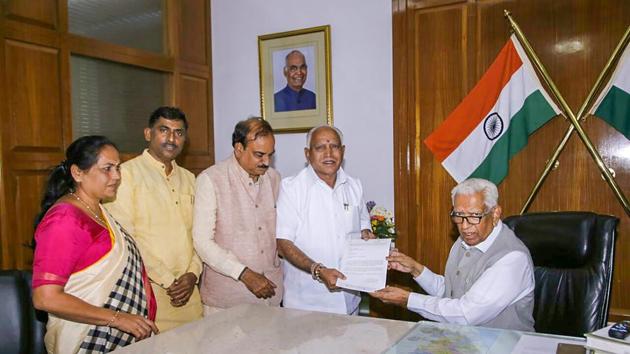Why Karnataka wasn’t a Modi versus Rahul fight
In a state that hasn’t allowed any incumbent to retain power in the past 33 years, this election was more about who could take Siddaramaiah’s place
Voters of Karnataka have neither decisively rejected the incumbent Congress party nor have they given a definitive mandate to its rival, the Bharatiya Janata Party (BJP). The Congress polled 13.82 million, 38%, of the votes cast, but won only 78 seats. The BJP polled less, 36.2%, but a better strike helped it win 104 seats. It has emerged as the single largest party, but fallen short of a majority in the 224-member state assembly.

Both national parties have won and lost in Karnataka, creating an opportunity for a regional party to cash in on the situation. Such is the irony that HD Kumaraswamy of the Janata Dal (Secular) that finished third, winning only 37 seats with a vote share of 18.4%, is now a frontrunner to head the next government.
We are suddenly reminded of a Panchatantra story about a monkey making hay while two cats fought (Do ki ladai mein teesre ka labh). But there is more to be read from the verdict, and read differently, from the popular spins doing the rounds.
The verdict, per se, wasn’t shaped by anti-incumbency. If that was the case, the Congress wouldn’t have polled 6.4 lakh votes more than the BJP and improved its vote share to 38% from 36.6% in 2013 and 35.13% in 2008. Several ministers and sitting MLAs lost, but their defeat had more to do with consolidation of opposition votes, which had split in 2013. Nor was it a vote for the leadership of Prime Minister Narendra Modi, as many political pundits would have us believe. The BJP had won 110 seats in 2008, its best ever, much before Modi arrived on the national scene. And the party’s vote share in this election is way below the 43.4% mark it touched in the 2014 Lok Sabha elections when the Modi wave swept the nation.
Also, Karnataka wasn’t a Modi vs Rahul fight. Had it been so, we would have had a clear mandate, either for the BJP or the Congress. In a state that hasn’t allowed any incumbent to retain power in the past 33 years, this election was more about who could take Siddaramaiah’s place. BS Yeddyurappa scored there, stitching up such local-level caste and community coalitions that would eventually help his party win the highest number of seats.
Lastly, Karnataka was no semi-final to 2019. If it were, then there are more worries than cheers for the ruling BJP. Here is why.
With Tuesday’s verdict, BJP has lost a potential regional ally — a formidable one — for 2019. No matter who the governor invites to form the next government, a new anti-BJP alliance has taken shape in Karnataka. By quickly offering the crown to kingmaker Kumaraswamy, the Congress has demonstrated its willingness to get off its high horse and facilitate any coalition that can challenge the BJP. Such a stance also sends a positive message for similar coalition-building in other parts of the country — especially in the Hindi heartland.
In Karnataka, the combined vote share of the Congress and JD-S now stands at 56.4%. If they come to an understanding for 2019, together they can win 20 or more of the 28 Lok Sabha seats in the state. That will be a big loss for the BJP, which currently has 16 MPs from this state.
That said, Karnataka is an important chapter in the coming together of regional parties, which have become wise to what the BJP really means for them. The implications will unfold in the days to come.
The next stop will be Kairana in western Uttar Pradesh, where Lok Sabha by-elections will be held in a fortnight. The BJP is defending the Lok Sabha seat against a formidable coalition of smaller/regional parties – the Samajwadi Party, the Bahujan Samaj Party and the Rashtriya Lok Dal – supported by the Congress.
Kairana is the next litmus test for the new template, which, to resonate louder, needs a powerful narrative against the nation’s most powerful communicator. This is one challenge where the regional parties will be more than eager to be led by the Congress. It is time the latter recognised the imperative.
(The author tweets @rajeshmahapatra)




